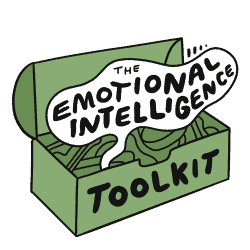Emotional intelligence is a popular buzz-phrase floating around your relatives’ Facebook statuses, Brené Brown-wannabe Twitter accounts, coffee conversations and even season twenty-one of ABC’s popular show The Bachelor. So… what is it?
Emotional intelligence is defined by Oxford Living Dictionaries as the “capacity to be aware of, control, and express one’s emotions and to handle interpersonal relationships judiciously and empathetically.” Emotional intelligence — just like all forms of intelligence — must be learned through repetition and practice. In order to build healthy and fulfilling relationships, you have to build up your emotional literacy first. Here are three quick tips to build up your emotional-intelligence tool kit. 
1. Get to know yourself
Whether with the help of counselling, a journal or a meditation app like Headspace, it is important to get to know yourself. Spend time with yourself, take yourself on dates, or even just spend some time at home with a crossword puzzle. In order to know what you need and how you’re feeling, you need to take the time to learn about who your “true self” is. Studies have shown that people who claim to know themselves well have a greater sense of purpose. If you don’t know who you are, how can you expect anyone else to know for you?
2. Avoid the platitude attitude
Platitudes are basically words and phrases that are so overused that they’re no longer meaningful. “Let me know if you need anything” and “We should hang out sometime” are just two examples. Instead of being vague, make an effort to be intentional in your relationships. Instead of saying “I’m here if you need anything,” try saying “Would you like to grab some snacks and watch a movie with me?” or something relatively similar.
The popular meditation app Headspace notes that “the first step towards altering a habit is setting the intention to be aware. It may be a tiny difference to begin with, but maintain that sense of awareness and slowly the pattern, seen clearly, begins to dissolve.” They say practice makes perfect, which isn’t exactly true, but working towards intentionality by avoiding platitudes can produce more satisfactory relationships.
3. Set boundaries
Sometimes, we just overload ourselves — whether physically, emotionally, mentally or all three and beyond. It can be hard to say no, but in order to live a healthy life and keep on growing, saying no is unavoidable. Saying no doesn’t mean you love your friends any less or don’t care about your future. Saying no is recognizing that you can’t do it all and that it’s not fair to promise anything to anyone when you can only give a solid twenty per cent.
Setting boundaries can also manifest in taking introvert breaks at parties, saying no to events or packing a granola bar for a night out so as not to unleash your hangry self on others. Despite their daunting appearance, boundaries are not a selfish thing. Wendy Rose Gould notes on the Headspace blog that “it’s not only beneficial for you to manage burnout but good for those around you, as well. Sometimes, that means prioritizing yourself over those you care about, and sometimes, that means saying no to a project or event you would normally say yes to.”
Whether you’re familiar with the concept of emotional intelligence or are just being introduced to it, everyone can benefit from practicing emotional skills and techniques. In practicing an emotional skill set, you will find greater satisfaction in your relationships and in yourself.
—
Ashlynn Weisberg
Graphic: Jaymie Stachyruk / Graphics Editor
Leave a Reply